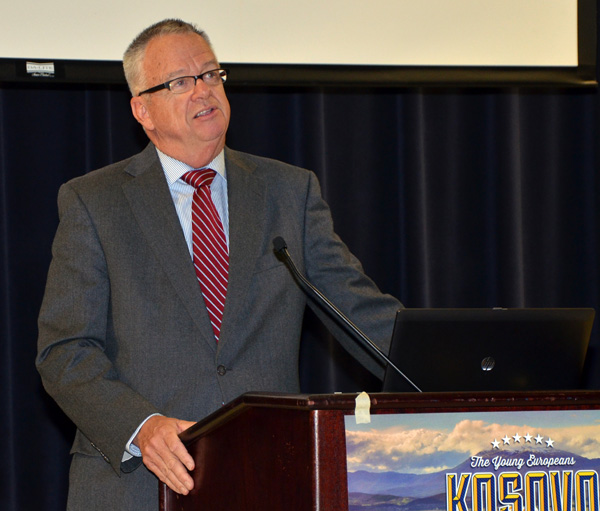By Olivia Herr.
Imagine you live in a place that is in constant conflict. A place where cultures clash and isn’t even recognized as an independent country. It can be extremely hard if you are from a place like the United States.
For the Honorable Larry Eisenhauer, a senior judge with the Iowa Court of Appeals, he didn’t have to imagine. He experienced the hardships working abroad in Kosovo as part of a UN mission in 2005.
Wednesday, November 20, he shared his experiences with DMACC students. He also gave a background of the struggles Kosovo faced before declaring independence.
Kosovo is a small nation in southeastern Europe that was a southern province of Yugoslavia with a population of about two million people.
He faced many difficulties preparing the presentation.
“It’s easy for me to talk about my experiences while I was there but discussing the war, which was one aspect I was asked to address, was brutal and caused a lot of serious pain to residents of Kosovo. The war highly affected my work while I was there.”
Eisenhauer started out by explaining some of Kosovo’s history. Kosovo has encountered a great amount of strife in the years leading up to its independence.
In 1989, Slobodan Milosevic came to power and reduced Kosovo to a small region in Serbia. The local government banned Albanian culture, which was a major part of the population in the area. This caused many civil servants to lose their jobs, including judges.
Kosovo claimed it’s independence in 1991, but other countries did not yet recognize it.
George H. W. Bush informed Milosevic that Serbian aggression would bring U. S. collateral intervention in 1992. Liberation emerged in 1996.
Prior to that most negotiations had been peaceful, but with the rise of the Kosovo Liberation Army (The KLA), violence significantly increased.
There are two major aspects of the war: the conflict between the KLA and the Serbian central forces and the NATO bombing campaign that began in March 1999.
There were significant local fights. Serb forces once surrounded a KLA family compound and killed 50 members of the family.
Soon after, Serb forces withdrew. Refugees felt it was safe to return to their homes and wanted to return to normal everyday life. Chaos ensued when this happened. There was significant lack of water and food.
Relatives of the missing participated in protests. Albanians then attacked the Serbs. Buildings, homes and churches were destroyed.
A big reason why Eisenhauer was participating the UN mission was to keep favoritism or discrimination from happening in the judicial system.
One case he worked on was a situation where young women were being lured and forced into prostitution. Another case was when members of the KLA were up for an appeal.
A major challenge Eisenhauer faced while working abroad was the language barrier. Translators always had to be on hand. There are a lot of commonalities in Yugoslav laws put in place by Milosevic.
One of his last memories of Kosovo was seeing children clean up rubble in the street right outside of the apartment he stayed in.
“It was indicative of the attempt that is being made to improve the lives of people of Kosovo and overall the country.”






Comments